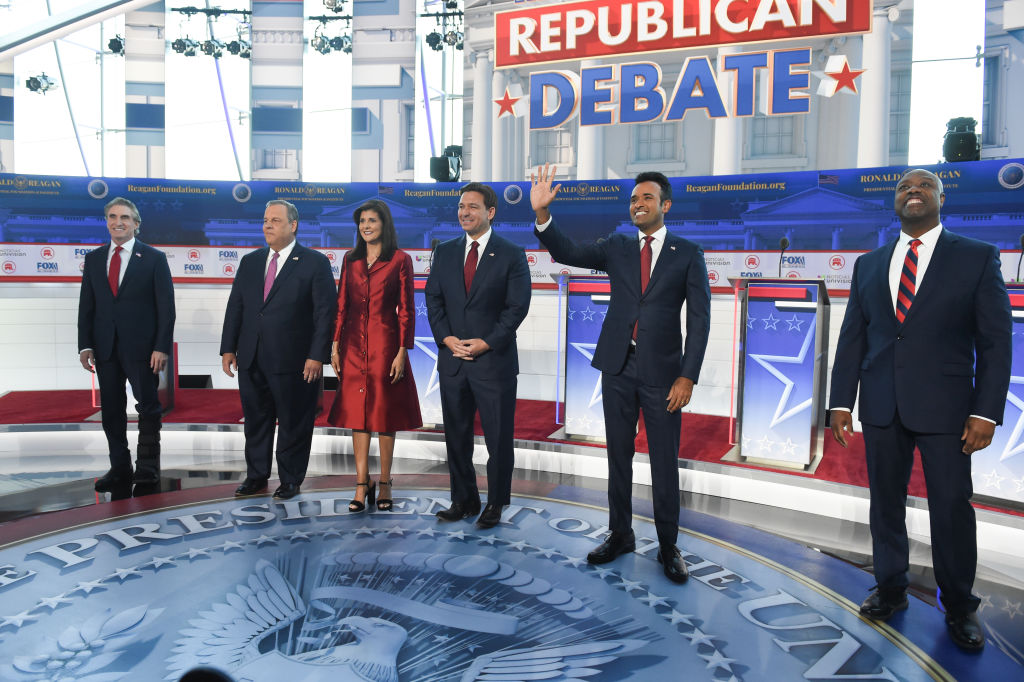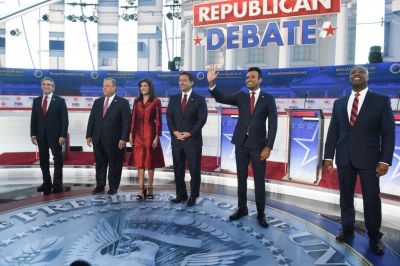LAS VEGAS—The failure of the Republican primary field to consolidate behind a consensus alternative to Donald Trump—plus the lack of any organized effort or mechanism to force out struggling candidates—is stymying GOP insiders working to block the former president from the 2024 nomination.
Trump leads his nearest competitor by 46 percentage points in national polling and fares almost as well in key early primary states. No candidates besides Ron DeSantis and Nikki Haley are cracking double digits. Yet less than 75 days until Iowa’s caucuses, none of the former president’s six other recognizable primary opponents appear to be going anywhere. Here in Nevada, along the sidelines of an annual Republican Jewish Coalition conference, GOP financiers and activists supporting alternative candidates conceded the obvious: It’s a major problem.
“It has to consolidate,” said Fred Zeidman, a veteran Republican donor from Houston who is backing Haley, the former U.S. ambassador to the United Nations and ex-South Carolina governor. “That’s really the story.” Asked by The Dispatch if there was some way to push stragglers out of the race, or persuade them to pull the plug on their campaigns, Zeidman was candid: “No.”
Several factors are working against consolidation. But one rather crucial obstacle to slimming the primary field is that even some Republican insiders particularly anxious about Trump winning the nomination are content to give their preferred candidate more time to prove viability. For instance, Eric Levine, a Republican donor from New York who’s backing Sen. Tim Scott,, believes Trump “is completely unqualified to be president.”
Still, Levine believes it’s too early for Scott to drop out, despite his inability to gain traction, drop in the polls and falling back to an “Iowa or bust” strategy.
“Consolidation must happen, there’s no two ways about it. I expect that every responsible candidate will come to that conclusion,” Levine said, in an interview during last weekend’s Republican Jewish Coalition gathering. “I think Iowa is the place where it has to happen. After Iowa comes in, if you’re not in the top three, get out.” Scott is currently sitting at 1.7 percent nationally, 6 percent in Iowa and fourth place (7.8 percent) in his home state.
But it’s unfair to single out Scott.
North Dakota Gov. Doug Burgum is polling at 0.7 percent nationally, 1.5 percent in Iowa, 2 percent in New Hampshire and 0.3 percent in South Carolina—numbers that have been virtually unchanged since he launched June 7. But don’t tell Burgum. The governor, largely self-financing his campaign from the billions he earned as a software mogul before entering politics, bristles at suggestions he should consider exiting the race.
“The craziest thing I hear is that people say: Oh, people should be dropping out ahead of when the voters start voting? Well, if someone’s going to drop out, maybe the people who should drop out are the ones who have never created a job and never made payroll,” Burgum said last month, in a Dispatch Podcast interview.
Such attitudes in the primary field are good news for Trump, as Republican Jewish Coalition board member Ari Fleischer explained to reporters during a news conference in Las Vegas.
“It’ll be impossible for anybody to beat Donald Trump if it’s not one-on-one,” said Fleischer, a Republican who is neutral in the primary and served as White House press secretary under President George W. Bush. “If it’s one-on-one, I think it’s a fair fight.”
In the modern age of cable television news and social media, small-dollar online fundraising from grassroots donors, and direct voter selection of nominees via primaries and caucuses in the states, the major political parties have evolved into glorified ballot access organizations. In other words, the Republican National Committee is virtually powerless to police GOP nominating contests—or the White House contenders who enter them. By next summer’s quadrennial conventions, the de facto nominees will have the delegates locked up, with the floor votes mere formalities.
But even if the party did have more power, neither ideologically oriented conservative groups that want to enforce fidelity to party orthodoxy, nor politically pragmatic, wealthy donors focused on electability have the juice to control the primary. They aren’t influential with grassroots primary voters, and they aren’t able to monopolize resources.
“There’s an appetite to force consolidation on the field. There’s just no mechanism to do it,” a veteran Republican operative who advises wealthy GOP donors lamented, requesting anonymity to speak candidly. “That’s not to say the candidates might not individually make a decision—they could pull themselves out. But it won’t be because someone from the sidelines wills it so.”
In 2016, Trump similarly benefited from a crowded primary, though his lead was far more surmountable than it is today. But the future 45th president won in part because his opponents hopelessly (and haplessly) divided up the support from voters who preferred an alternative candidate. Four years later, the Democratic presidential candidates delivered a masterclass on consolidating in a primary, motivated by an overriding desire to beat Trump.
In the 2020 Democratic primary, future President Joe Biden revived his anemic campaign with a huge win in South Carolina, spurring rivals Pete Buttigieg, now the secretary of transportation, and Sen. Amy Klobuchar of Minnesota to exit the race. A few days later, after Biden ran the table in the Super Tuesday primaries, former New York Mayor Mike Bloomberg and Sen. Elizabeth Warren of Massachusetts also dropped out.
It’s doubtful the kind of angst Democrats had about Trump in 2020 exists among his 2024 primary opponents. But some Republican insiders say there are discussions occurring behind the scenes about taking action to force the field to shrink. Although there isn’t a formal process to force consolidation, some believe it can happen and are attempting to figure out a work-around.
The third GOP debate, this Wednesday in Miami, could be a pivot point. Haley, in a dogfight with DeSantis to emerge as the consensus alternative to Trump, is poised to benefit from such efforts.
The former ambassador is rising in recent polls while DeSantis has appeared stagnant. A Republican grandee predicted GOP donors and activists who have been keeping their powder dry or supporting other non-Trump candidates may swing her way, pressuring others to end their campaigns “if she is the object of attacks in the third debate—which I think she will be—and she handles it well.”
New Hampshire Gov. Chris Sununu telegraphed as much this week. Sununu, who has repeatedly vowed to use his bully pulpit as the top Republican in a key early primary state to force consolidation, said during a campaign appearance with Haley that he is warming toward an endorsement. “Are you ready to endorse me yet?” Haley asked Sununu, during a joint appearance at a New Hampshire town hall meeting. His answer? “Getting closer everyday.”
Still, despite optimism among some in the GOP that the field could consolidate, broad expectations remain low—even in the wake of Mike Pence abandoning his White House campaign.
The former vice president announced his decision during a keynote speech to the more than 1,000 Republican Jewish Coalition members and guests who gathered in a Las Vegas convention hall ballroom to hear from what were, then, the seven major GOP White House contenders.
Pence’s move was not surprising in and of itself: His support was weak, even in Iowa, where he spent most of his time on the trail, and his fundraising was worse. Speculation was rampant that he would not meet the RNC’s polling and donor thresholds to qualify for the third debate.
But the loud gasps of shock that erupted as Pence said he was suspending his campaign seemed revealing of a crowd of Republican donors and activists who were not expecting any consolidation in the primary, at least not until after the January 15 Iowa caucuses—no matter a candidate’s long odds.
“Wasn’t that something?” said Ed Cox, the New York Republican Party chairman who was in the room. “It was dramatic.”







Please note that we at The Dispatch hold ourselves, our work, and our commenters to a higher standard than other places on the internet. We welcome comments that foster genuine debate or discussion—including comments critical of us or our work—but responses that include ad hominem attacks on fellow Dispatch members or are intended to stoke fear and anger may be moderated.
With your membership, you only have the ability to comment on The Morning Dispatch articles. Consider upgrading to join the conversation everywhere.